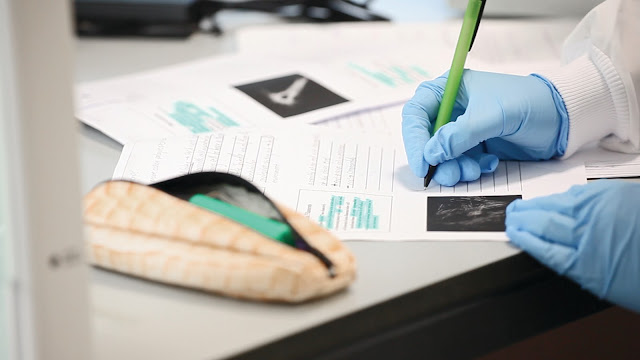By Katherine Inskip
The challenge
Experimental laboratory work is a core component of the undergraduate physics degree. It provides hands-on training in key skills in experiment design, data acquisition and analysis, supports understanding of what are often otherwise abstract topics, and enables students to develop transferable skills in communication and group working.
The laboratory environment can be a stressful one. While degree-level laboratory investigations are challenging in their own right, other aspects of laboratory work can sometimes cause equal or greater concern. Labs are a social and often chaotic environment, where students may have different tasks each week. Noise levels and the flow of people may be unpredictable. For some students, this can greatly limit the accessibility of this essential learning environment.
Autistic students in particular may encounter barriers to learning in a lab situation. Autism is a form of neurodiversity, and is a spectrum condition that can have impacts on social communication and how people interact with and experience their environment. In physics, the prevalence of autism spectrum conditions among students is well into double digits, but, as the saying goes, “If you’ve met one person with autism, you’ve met one person with autism.” Every autistic student will have their own unique needs, and it is important that these are recognised and accommodated.
Typically, access to disability support for autistic students begins with the creation of a bespoke learning support plan via DDSS. However, DDSS staff will not be intimately familiar with the details of/arrangements for laboratory teaching across every course at the University, and lab staff may not be confident in interpreting broadly similar learning support plans differently for different individuals.
As Disability Liaison Officer (DLO) for physics, I recently worked with a student on clarifying her needs within the laboratory environment. Given the challenges of expecting students with social communication disabilities to advocate for themselves and the seemingly contradictory accommodations needed by different students with the same underlying condition, I realised that there might be a better way of approaching this challenge…
The resource
Every autistic student is different, but (broadly speaking) the same cannot be said of the laboratory environment! With forethought, the specific challenges of the laboratory environment and lab teaching/learning tasks can be identified, along with a range of potential solutions. These are collected into a concise document which is circulated to all undergraduate physics lab staff, DDSS, and students with autism spectrum conditions. It’s also available here: Laboratory Accessibility Support for Autistic Students.
DDSS advisors can make use of this document in dialogue with the student, identifying the likely accessibility challenges and highlighting best practice accommodations. The document can be used to facilitate an effective, specific, and streamlined conversation between lab staff and individual students, supporting the implementation of any necessary accommodations. Additionally, the student can refer back to the document if ever any self-advocacy is needed.
While the original resource has been designed with the physics laboratory environment in mind, very little of it is subject-specific. It can be readily adapted to the teaching environments of other departments, both within the Faculty of Science and beyond.
Feedback
Here’s what a range of users have to say about this document:
- DDSS:
Trying to understand and take into account the challenges that autistic students may face engaging in lab sessions, and putting in place adjustments to reduce or resolve them, is key to ensuring that this form of learning is engaging and enjoyable for them.
This guide offers very clear and constructive guidance on how colleagues can ensure that they can meet individual students' needs in laboratory sessions. Its focus on the barriers inherent to this teaching environment and ways to overcome or reduce these also makes it a helpful resource for staff to use when having a discussion about lab accessibility/inclusivity with any student - or when designing activities for whole cohorts of students.
- Dr Mark Quinn, Lab staff:
I recently used this guide in conversation with a level 1 student who was having a very challenging experience in the lab. Having the lab support guide helped structure this discussion for both myself and the student which meant we could identify the main areas of support: the provision of a quieter working location and defining more concise objectives. This will also feed in to making positive changes to the lab sessions and learning material which will benefit all students.
- Julia, a student:
The main way to help autistic students is to communicate with us! We’re all different: there’s no magic solution that helps everybody. Autistics can be bothered by sensory things that the lab techs / tutors may not even notice, so talking to the students in advance and as the semester progresses is probably the best way to address the sensory stresses. Breaks are very helpful! And I don’t want to be wholly responsible for warning every autistic I know that Week 6’s experiment is louder than usual. For me personally the open-ended, what-do-you-think-you-should-do, be creative nature of the lab stresses me the most. Sometimes it helps to have someone tell you what the point of each session is – e.g. is it learning how oscilloscopes work (don’t stress over the data) or writing the lab report (focus on the data acquisition not the analysis).
This document is definitely a useful starting point for improving lab space for autistics, especially if they don’t have a learning support plan yet. (Lots of autistics go into Science but not everyone can get an expensive or time consuming formal diagnosis – the NHS waiting list is approx. 2 years long for our age group!) Having a little extra support for students who are struggling due to unknown ASC is always a good thing. You won’t be able to make the lab comfortable for everyone, but please don’t make us feel like that’s our fault (we can’t help being this way).


